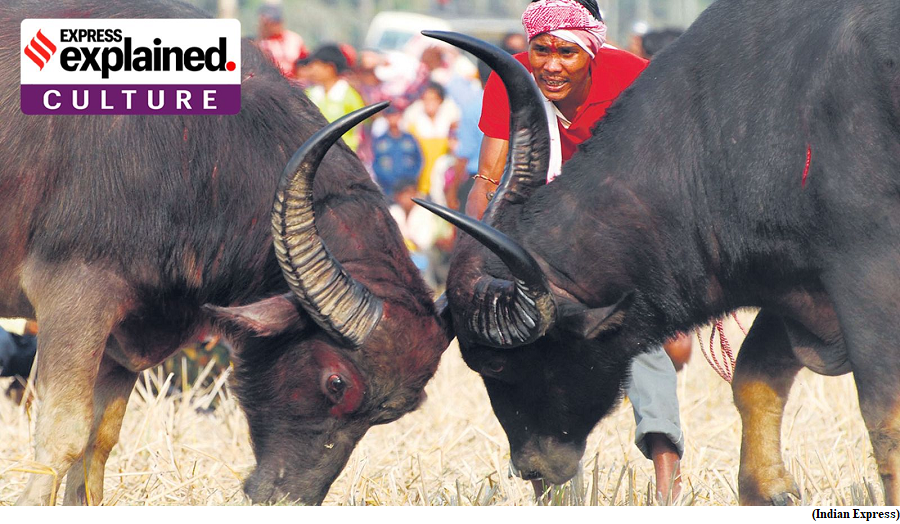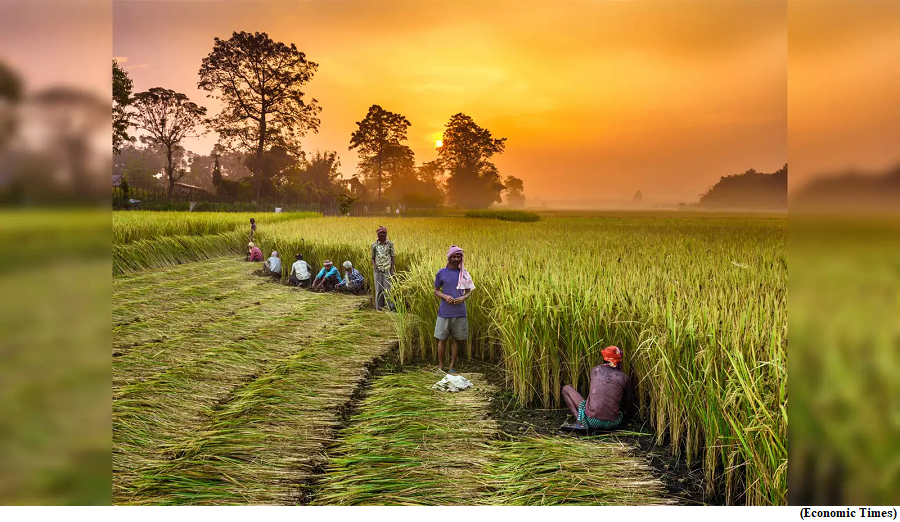Why PETA wants to ban two age-old Assamese traditions (GS Paper 2, Governance)

Why in news?
- The Assam government’s attempt to revive traditional practices of buffalo and bulbul (songbird) fighting during Magh Bihu has come up against a legal challenge by People for Ethical Treatment of Animals (PETA) in the Gauhati High Court, which admitted petitions by PETA India seeking a ban on both.
What is this tradition all about?
- These fights are part of the folk culture associated with the Assamese winter harvest festival of Magh Bihu, which takes place in January, at the same time as harvest festivals in other parts of the country such as Makar Sankranti, Pongal and Lohri.
- Buffalo fights are held in different parts of Assam during Magh Bihu, with Ahatguri in Nagaon district being the biggest centre.
- There, the fights been conducted for many decades by the Ahatguri Anchalik Moh-jooj aru Bhogali Utsav Udjapan Samiti, drawing huge crowds.
- Bulbul fights, on the other hand, are an attraction at the Hayagriv Madhab Mandir in Hajo, around 30 km from Gauhati. Participants rear birds for around two weeks before Bihu, before they are made to fight until one emerges stronger.
Discontinued after SC ruling:
- The fights had been stopped on the heels of the Supreme Court’s 2014 judgement, which forbid the use of bulls as performing animals in jallikattu events and bullock-cart races in Tamil Nadu, Maharashtra or anywhere else in the country.
- The Court also directed the Animal Welfare Board of India (AWBI) to ensure that “the person-incharge or care of the animal shall not incite any animal to fight against a human being or another animal.”
- In January 2015, the AWBI wrote to the Assam government seeking an end to animal and bird fights during Bihu celebrations, following which the government directed district administrations to prevent them.
- This was not without resistance. Buffalo fights continued to be held in some quarters in defiance of the prohibition, and the management of the Hayagriv Madhab Temple challenged the order in the Gauhati High Court.
Supreme Court ruling in May 2023:
- The Supreme Court in May 2023 overruled its 2014 judgement, upholding amendments made by Tamil Nadu, Maharashtra and Karnataka governments to the Prevention of Cruelty to Animals Act 1960 to allow jallikattu, kambala and bullock cart racing.
SOPs by Assam Cabinet:
- Subsequently, in December, the Assam Cabinet gave a go-ahead for the framing of SOPs for the conduct of buffalo and bulbul fights without “deliberate torture or cruelty” to the animals.
- The SOPs which were subsequently released specified that the fights will only be permitted in places where they have been “traditionally conducted” for the last 25 years, and that moh juj (buffalo fights) will only be allowed between January 15 and January 25.
- The moh juj guidelines prohibit human inflicted injuries, and ban the use of intoxicating or performance enhancing drugs, as well as sharp instruments to instigate the animals.
- The bulbul fight SOPs require the organisers to ensure that the birds are released in the open “in perfect condition” at the end of the game. The SOPs state that any organization violating the stipulations will face a ban for the next five years.
PETA’s challenge:
- PETA India has now filed two linked petitions before the Gauhati High Court seeking the prohibition of both activities, as well an interim stay preventing any such fights from taking place during the course of the proceedings.
- In these petitions, they state that they investigated the events in both Ahatguri and Hajo. The claimed that in Ahatguri, in order to instigate buffalos to fight, owners slapped, pushed and shoved them; jabbed and struck them with wooden sticks; and pulled them roughly by nose ropes. They stated that many buffalos had injuries on their bodies from the fights, and that the fights lasted util one of the two buffalos “broke away and fled”.
- With regards to the event in Hajo, they stated that the bulbuls “were illegally captured and incited, against their natural instincts to fight over food.”
Schemes for Welfare of Farmers
(GS Paper 3, Economy)
Context:
- Details of schemes being run by Department of Agriculture and Farmers’ Welfare for welfare/increasing incomes of farmers and the achievements made therein.

Pradhan Mantri Kisan Samman Nidhi (PM-KISAN):
- PM-KISAN is a central sector scheme launched on 24th February 2019 to supplement financial needs of land holding farmers, subject to exclusions.
- Under the scheme, financial benefit of Rs. 6000/- per year is transferred in three equal four-monthly installments into the bank accounts of farmers’ families across the country, through Direct Benefit Transfer (DBT) mode.
Pradhan Mantri Kisan MaanDhan Yojana (PM-KMY):
- Pradhan Mantri Kisan Maandhan Yojna (PMKMY) is a central sector scheme launched on 12th September 2019 to provide security to the most vulnerable farmer families.
- PM-KMY is contributory scheme, small and marginal farmers (SMFs), subject to exclusion criteria, can opt to become member of the scheme by paying monthly subscription to the Pension Fund. Similar, amount will be contributed by the Central Government.
- The applicants between the age group of 18 to 40 years will have to contribute between Rs. 55 to Rs. 200 per month till they attain the age of 60.
- PMKMY is taking care of the farmers during their old age and provides Rs. 3,000 monthly pension to the enrolled farmers once they attain 60 years of age, subject to exclusion criteria.
- Life Insurance Corporation (LIC) is pension fund manager and registration of beneficiaries is done through CSC and State Govts.
Pradhan Mantri Fasal Bima Yojana (PMFBY):
- PMFBY was launched in 2016 in order to provide a simple and affordable crop insurance product to ensure comprehensive risk cover for crops to farmers against all non-preventable natural risks from pre-sowing to post-harvest and to provide adequate claim amount.
- The scheme is demand driven and available for all farmers
Modified Interest Subvention Scheme (MISS):
- The Interest Subvention Scheme (ISS) provides concessional short term agri-loans to the farmers practicing crop husbandry and other allied activities like animal husbandry, dairying and fisheries.
- ISS is available to farmers availing short term crop loans up to Rs.3.00 lakh at an interest rate of 7% per annum for one year. Additional 3% subvention is also given to the farmers for prompt and timely repayment of loans thus reducing the effective rate of interest to 4% per annum.
- The benefit of ISS is also available for post-harvest loans against Negotiable Warehouse Receipts (NWRs) on crop loans for a further period of six months post-harvest to small and marginal farmers having Kisan Credit Cards (KCCs), on occurrence of natural calamities and severe natural calamities.
Agriculture Infrastructure Fund (AIF):
- In order to address the existing infrastructure gaps and mobilize investment in agriculture infrastructure, Agri Infra Fund was launched under Aatmanirbhar Bharat Package.
- The Agriculture Infrastructure Fund is a medium - long term debt financing facility for investment in viable projects for post- harvest management infrastructure and community farming assets through interest subvention and credit guarantee support.
- The Fund of Rs. 1 lakh crore under the scheme will be disbursed from FY 2020-21 to FY2025-26 and the support under the scheme will be provided for the duration of FY2020-21 to FY2032-33.
- Under the scheme, Rs. 1 Lakh Crore will be provided by banks and financial institutions as loans with interest subvention of 3% per annum and credit guarantee coverage under CGTMSE for loans up to Rs. 2 Crores. Further, each entity is eligible to get the benefit of the scheme for up to 25 projects located in different LGD codes.
Formation & Promotion of new 10,000 FPOs:
- The Government of India launched the Central Sector Scheme (CSS) for “Formation and Promotion of 10,000 Farmer Producer Organizations (FPOs)” in the year 2020.
- The scheme has a total budgetary outlay of Rs.6865 crores.
- Formation & promotion of FPOs are to be done through Implementing Agencies (IAs), which further engage Cluster Based Business Organizations (CBBOs) to form & provide professional handholding support to FPOs for a period of 5 years.
National beekeeping and Honey Mission (NBHM):
- Keeping in view the importance of beekeeping, a new Central Sector Scheme entitled National Beekeeping & Honey Mission (NBHM) was launched in 2020 under Atma Nirbhar Bharat Abhiyan for its implementation in the field for overall promotion and development of scientific beekeeping & to achieve the goal of “Sweet Revolution”.
Market Intervention Scheme and Price support Scheme (MIS-PSS):
- Ministry of Agriculture & Farmers Welfare implements the Price Support Scheme (PSS) for procurement of pulses, oilseeds and copra. Market Intervention Scheme (MIS) for procurement of agricultural and horticultural commodities which are perishable in nature and are not covered under the Price Support Scheme (PSS).
- The objective of intervention is to protect the growers of these commodities from making distress sale in the event of a bumper crop during the peak arrival period when the prices tend to fall below economic levels and cost of production.
Namo Drone Didi:
- The Government has recently approved a Central Sector Scheme for providing drones to the Women Self Help Group (SHGs) for the period from 2024-25 to 2025-26 with an outlay of Rs. 1261 Crores.
- The scheme aims to provide drones to 15000 selected Women Self Help Group (SHGs) for providing rental services to farmers for agriculture purpose (application of fertilizers and pesticides).
- Under this Scheme, Central Financial Assistance @ 80% of the cost of drone and accessories/ancillary charges upto a maximum of Rs. 8.0 Lakhs will be provided to the women SHGs for purchase of drones.
- The Cluster Level Federations (CLFs) of SHGs may raise the balance amount (total cost of procurement minus subsidy) as loan under National Agriculture Infra Financing Facility (AIF). Interest subvention @ 3% on the AIF loan will be provided to the CLFs.
- The scheme will also provide sustainable business and livelihood support to SHGs and they would be able to earn additional income of at least of Rs. 1.0 lakh per annum.



